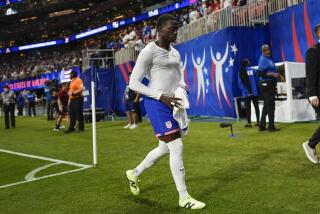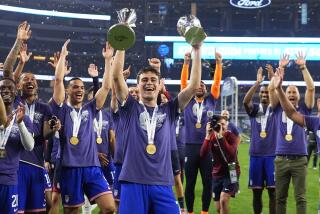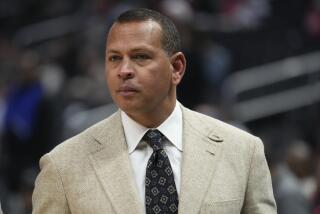WORLD CUP USA ’94 / THE FIRST ROUND : Maradona Facing a Ban After Positive Drug Test : Argentina: Ephedrine shows up in sample. Results of critical second test will be announced today.
- Share via
DALLAS — Diego Maradona, one of the most brilliant and controversial figures in soccer, was at the center of a drug scandal that shook the World Cup on Wednesday after he tested positive for a banned cold medication.
On the eve of Argentina’s final first-round match, against Bulgaria tonight at the Cotton Bowl, it was announced Maradona’s “A” urine sample had traces of ephedrine, an anti-asthma stimulant found in over-the-counter medications.
Julio Grondona, president of the Argentine Football Federation, made the announcement on the side of the Cotton Bowl where the players, including Maradona, were supposed to practice Wednesday evening.
But instead of playing soccer, the Argentines sat on the field in small groups looking sullen and talking with federation and FIFA officials for about a half hour. Maradona sat with his teammates near one goal, a tiny figure whose every move was scrutinized by hundreds of journalists sitting in the stands.
Later, at the team hotel, Grondona said until the results of a “B” sample were known, it was impossible to speculate what could happen. The second sample was tested at the UCLA drug laboratory Wednesday afternoon in the presence of Raul Peidro, an Argentine team doctor, and other soccer officials.
“It was not a happy moment,” one of the physicians said. “But it was done in a calm manner.”
FIFA, soccer’s governing body, is expected to announce the results today at its World Cup headquarters in Irving, Tex.
Although the players were kept away from a swarm of reporters following the team, Maradona told a Buenos Aires television station: “It’s my fault. I did it. It’s me.”
Still, Argentine officials listed Maradona’s name in today’s starting lineup. A once-magical midfielder, Maradona, 33, is playing in what is expected to be his final World Cup tournament. Appearing in his fourth World Cup, Maradona would set a record of 22 Cup matches if he plays tonight.
Jim Trecker, a spokesman for World Cup ‘94, said the controversy will not ruin the image soccer has created in the past three weeks.
“It certainly is a pity when something off the field becomes bigger than on the field,” he said, adding that it will not cast the tournament in a negative light.
If Maradona’s “B” sample is positive, FIFA’s Organizing Committee would form a special committee to study the case and determine what sanctions, if any, to levy. Agricole de Bianchetti, a federation attorney, and Daiel Bolotnicoff, Maradona’s attorney, were arranging meetings with FIFA officials late Wednesday.
Under FIFA’s drug policy, unlike most in American professional sports, sanctions are not specified for any particular offense, which gives FIFA flexibility in dealing with the case.
“If it’s positive, Maradona could be banned,” Grondona said. “It could be a year’s suspension.”
FIFA officials said Maradona would be suspended immediately if the second sample proves to be positive. Grondona said the team’s standing would not be affected, that any penalty would be against individuals. Argentina won its first two matches and has six points to lead Group D. Grondona said that Ernesto Ugalde, team physician, could be sanctioned if found to have given Maradona the medication.
Maradona, who was banned for 15 months in 1991 for cocaine abuse, tested positive for ephedrine after Argentina defeated Nigeria, 2-1, in Foxboro, Mass., on Saturday. He and teammate Sergio Vasquez were randomly selected to submit urine samples. Two players from each team are selected after every World Cup match to be tested.
Grondona said the drug was a nasal spray not prescribed by the team doctor but by Maradona’s private physician. Maradona was said to have taken the medication to combat flu, and claimed he did not know it was a banned substance. He claimed his physician forgot to tell federation doctors about the medication.
If so, it was a reckless act, according to those familiar with FIFA’s drug-testing policy. Not only was a drug hotline set up by Donald Catlin, director the UCLA drug laboratory that is handling the World Cup specimens, but teams must declare before each game what drugs they have taken.
Ephedrine, once a popular drug for sprinters and cyclists, is not used much by athletes anymore, Catlin said Wednesday night.
Unlike some sports, doping scandals have been rare in soccer. Twice players have been dismissed from the World Cup finals by FIFA for using drugs. The first was defender Ernest Jean-Joseph of Haiti in Germany in 1974. But his team manager refused to send him home and he had to be extradited by security men sent from Haiti. He never played again.
At the 1978 finals in Argentina, Willie Johnston of Scotland was sent home in disgrace and banned for taking an illegal drug for medicinal purposes.
Times staff writer Julie Cart contributed to this story from Los Angeles.
The Turbulent Times of Maradona
Maradona is one of the world’s best-known athletes, both for his skill on the soccer field and his innate ability to find trouble off it. The following is a look at Maradona’s roller-coaster life:
Oct. 30, 1960: Diego Armando Maradona was born in Lanus, Argentina.
October, 20 1976: Played his first game as a professional for the Argentino Juniors.
Feb. 27, 1977: Played his first game as a member of the Argentine national team.
July, 1982: Played on the Argentine World Cup team but was sent off the field in the closing moments of a losing game after kicking an opposing player in the stomach.
August, 1984: Went from the Spanish club Barcelona to Napoli in Italy for a record $10 million transfer fee.
June 22, 1986: Scored the first goal on an apparent hand ball in a 2-1 victory over England in a World Cup quarterfinal. He said the ball was punched by “The Hand of God.” Argentina went on to win the Cup.
November, 1989: Married Claudia Villafane, the mother of his two daughters. His wedding cost about $3 million and during the reception he punched out a photographer.
July, 1990: Led his team to the World Cup final in Rome. The game was won by West Germany, 1-0, and he said the whole tournament was tainted by “Mafia influence.”
August, 1990: Returned to his Italian club team.
April 6, 1991: Suspended by FIFA for 15 months for cocaine use discovered during post-match testing after an Italian League game.
April 26, 1991: Arrested in Argentina for possession and distribution of illegal narcotics.
Sept. 18, 1991: Received a 15-month suspended sentence for previous drug charges.
June 1992: Signed by Seville of Spain; he later quit the club after less than one season.
Sept. 12, 1993: Returned to Argentina to play for the Newell’s Old Boys club team.
Feb. 1, 1994: Was fired for skipping practices.
Feb. 2, 1994: Fired a compressed-air rifle at journalists, slightly injuring five.
June 29, 1994: Head of the Argentine soccer delegation says Maradona tested positive for ephedrine. A second sample will be tested to confirm.







